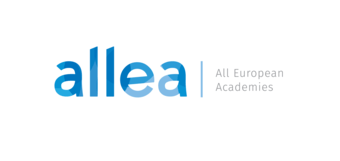All European Academies
All European Academies (ALLEA) is the European Federation of Academies of Sciences and Humanities. It was founded in 1994 and brings together more than 50 Academies of Sciences and Learned Societies from over 40 member countries of the Council of Europe. Since May 2018 the President of ALLEA is Antonio Loprieno. ALLEA is financed by annual dues from its member academies and remains fully independent from political, religious, commercial or ideological interests. The ALLEA secretariat is based on the premises of the Berlin-Brandenburg Academy of Sciences and Humanities in Berlin.[1]
 ALLEA, the European Federation of Academies of Sciences and Humanities | |
| Formation | 1994 |
|---|---|
| Headquarters | Berlin, Germany |
President | Antonio Loprieno |
Vice President | Krista Varantola |
| Luke Drury Ylva Engström Annette Grüters-Kieslich Maarten Prak Pere Puigdomènech Paweł Rowiński Neri Salvadori Joanne Scott Waldemar Zacharasiewicz | |
| Website | allea |
Mission
ALLEA's mission includes facilitating the collaboration between Academies, fostering excellence and high ethical standards in the conduct of research, promoting the autonomy of science and research, representing the European Academies' positions to the European authorities, and contributing to the improvement of the framework conditions for science and research. Jointly with its Member Academies, ALLEA is in a position to address the full range of structural and policy issues facing Europe in science, research and innovation. In doing so, it is guided by a common understanding of Europe, bound together by historical, social and political factors as well as for scientific and economic reasons.[2]
Member Academies
ALLEA Member Academies operate as learned societies, think tanks, or research performing organisations. They are self-governing communities of leaders of scholarly enquiry across all fields of the natural sciences, the social sciences and the humanities. ALLEA therefore provides access to an unparalleled human resource of intellectual excellence, experience and expertise. Furthermore, its integrative membership structure comprises Academies from both European Union (EU) and non–EU member states in Europe.[3]
List of members academies
- Academy of Sciences of Albania
- Armenian Academy of Sciences
- Austrian Academy of Sciences
- National Academy of Sciences of Belarus
- Royal Academy of Sciences, Letters and Arts of Belgium
- Académie royale de langue et de littérature françaises de Belgique
- Royal Academy of Dutch Language and Literature
- Royal Flemish Academy of Belgium for Science and the Arts
- Academy of Sciences and Arts of Bosnia and Herzegovina
- Bulgarian Academy of Sciences
- Croatian Academy of Sciences and Arts
- Czech Academy of Sciences
- Learned Society of the Czech Republic
- Royal Danish Academy of Sciences and Letters
- Estonian Academy of Sciences
- Council of Finnish Academies
- Georgian National Academy of Sciences
- German National Academy of Sciences Leopoldina
- Union of the German Academies of Sciences and Humanities
- Academy of Athens
- Hungarian Academy of Sciences
- Royal Irish Academy
- Israel Academy of Sciences and Humanities
- Accademia Nazionale dei Lincei
- Istituto Veneto di Scienze, Lettere ed Arti
- Accademia delle Scienze di Torino
- Academy of Sciences and Arts of Kosovo
- Latvian Academy of Sciences
- Lithuanian Academy of Sciences
- Academy of Sciences of Moldova
- Montenegrin Academy of Sciences and Arts
- Royal Netherlands Academy of Arts and Sciences
- Academy of Sciences and Arts of the Republic of North Macedonia
- Norwegian Academy of Science and Letters
- Royal Norwegian Society of Sciences and Letters
- Polish Academy of Sciences
- Polish Academy of Arts and Sciences
- Academy of Sciences of Lisbon
- Romanian Academy
- Russian Academy of Sciences (Associate Member)
- Serbian Academy of Sciences and Arts
- Slovak Academy of Sciences
- Slovenian Academy of Sciences and Arts
- Spanish Royal Academy of Sciences
- Royal Academy of Sciences and Arts of Barcelona
- Institute of Catalan Studies
- Royal Swedish Academy of Letters, History and Antiquities
- Royal Swedish Academy of Sciences
- Swiss Academies of Arts and Sciences
- Turkish Academy of Sciences
- The Science Academy (Bilim Akademisi)
- National Academy of Sciences of Ukraine
- The British Academy
- Learned Society of Wales
- The Royal Society
- The Royal Society of Edinburgh
Working Groups
The core of the scientific work of ALLEA is performed by its Working Groups. ALLEA Working Groups are advisory bodies concerned with specific issues and providing advice and guidance on matters related to science, science management and science policy on the European level. Their activities and services may vary from advising decision-makers and the general public to producing memoranda, statements, position papers or reports published under the auspices of ALLEA.
SAPEA
ALLEA, jointly with four other European academy networks, forms part of the EU-funded SAPEA (Science Advice for Policy by European Academies) project, bringing together knowledge and expertise of Fellows from over 100 Academies across Europe. SAPEA provides interdisciplinary, independent and evidence based-scientific advice on policy issues to the European Commission and the European public in the context of the European Commission's Scientific Advice Mechanism.[4]
References
- "About ALLEA -". www.allea.org. Retrieved 2018-01-22.
- "ALLEA Mission & Statutes". www.allea.org. Retrieved 2018-01-22.
- "Members -". www.allea.org. Retrieved 2018-01-22.
- "SAPEA: Science Advice for Policy by European Academies -". www.allea.org. Retrieved 2018-01-22.